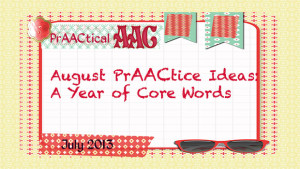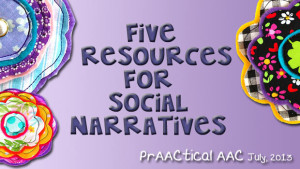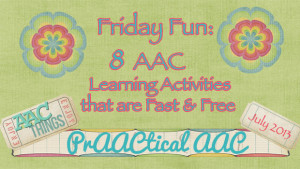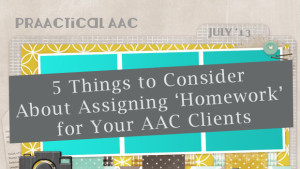August 6, 2013
by Robin Parker -

We had some great experiences this week with some awesome client’s and their families. We were reminded of this very effective language facilitation strategy: And if you need some ideas for waiting, check out 10 ways to practice waiting… for language. Waiting works best when you wait with eye brows raised (expectantly) and then if needed use a gestural cue towards the communication display and if more cueing is needed point to a more specific communication display cell(cells) as options. By then, you will probably get a self-initiated communication message. If not, model & honor the inferred intent and find another communication opportunity and wait…..
Filed under: PrAACtical Thinking
Tagged With: communication opportunity, Language facilitation strategies, wait and signal
August 5, 2013
by Robin Parker -

PrAACtical Thinking Free Text-based AAC Apps for the iPad PrAACtical Questions: Can Students Take Their AAC Device Home? PrAACtical AAC Learning & July 4th: Get Ready Get Set Go 4 Free July 4th Apps to SPARK Commenting 30 Posts You May Have Missed in June 4+AAC Tips for Talking About July 4th AFTER the Festivities PrAACtically Ready to Read Did You Know: AADMD Offers Specialty Webinars Visual Schedule Myths Live On..& On Getting to Yes Working with Worksheets Apps to Prepare, Learn, & Talk About Summer Vacations Modify a Battery-Operated Toy To Make It Accessible By Switches 5 Great Ways To Help People with AAC Needs Develop Inner Speech What’s the Connection: Core Vocabulary and Visual Schedules Random App of Kindness Giveaway: Talk About Food Create Your Own Style PECS Book 5 Things to Consider About Assigning ‘Homework’ to Your AAC Clients 8Friday Fun: 8 AAC Activities that are Fast... [Read More...]
Filed under: PrAACtical Thinking
Tagged With: aided language facilitation, Apps, augmentative and alternative communication, older students, visual supports
August 2, 2013
by Robin Parker -

Commenting is for everyone, even if they are beginning communicators and even if they need to learn. If you are teaching commenting to a learner who does not yet have this communication function, there has to be ‘buy in’ or interest through another communication function that is already known. So, for a learner who can ask for things they want or say ‘no’ to things they ‘don’t want’, you may need to form routines where they ask for something, comment, then can ask (and receive) again. Once the routine is established, you can add some more teaching and language facilitation strategies. We have written about commenting before but when we saw this cool photo on Facebook, we just had to mention commenting again. Commenting to the Max Go Ape! 10 Commenting Communication Temptations More Ways to Teach Commenting Make it Meaningful to the Learner – Just talking about things may... [Read More...]
Filed under: PrAACtical Thinking
Tagged With: commenting, communication functions
August 1, 2013
by Carole Zangari -

AAC technology is awesome. It really is. But it isn’t always ‘the answer.’ Here are a few things we try to keep in mind. 1. It’s not always the most efficient way for someone to communicate. Vocalizations, word approximations, gestures, and manual signs may be quicker and easier. 2. You always need a back-up. Another device, an app, a communication board, a PODD book, a print-out of the main SGD screens. Something. 3. It may not be the preferred means of communication with family and close friends. It’s not up to us to make that call. 4. The ‘latest thing’ isn’t always the best. Some of our prAACtical friends still lament the loss of the built-in printer on the Liberator. For them, the smaller, sleeker design of replacement devices weren’t worth the trade-off. 5. We generally don’t maximize the devices/apps we have. In some situations, there are useful features that... [Read More...]
Filed under: PrAACtical Thinking
Tagged With: 5, five, technology
July 31, 2013
by Robin Parker -

We continue to work with core words and if you have been following our ‘Year of Core Words’, here are some ways to use the August words for preparing, playing, & reading for summer fun and beginning school year activities. With some aided language modeling (ALI), repetition with variety, and meaningful language experiences, you will expand communication and core word vocabulary quickly. Stay Calm & Model On… AUGUST WORDS any like any make any drink stop any talk later any play is good bring bring it bring me some after done bring there bring more to me day fun day play is fun day go day after find day to go there fall fall down want fall big fall ready go fall give give some what give me who give that lets give him some hot more hot that is hot put hot thing there it hot not cold now job... [Read More...]
Filed under: PrAACtical Thinking
July 30, 2013
by Robin Parker -

We know it is early, but school starts for some of us as early as 2 weeks from now. As you are thinking of the goals that you will be working on with your students, children, clients, here are some samples, examples, & rationales for developing and writing AAC goals that matter. Once there are goals that make sense, then with meaningful language experiences, the fun can begin. AAC Goals PrAACtical Goals That Matter (Document of Goals) PrAACtical Suggestions for Writing AAC Goals Quick Start AAC Goals PrAACtical Goals That Matter Sample AAC Goals How I do It: AAC in the IEP by Lauren Enders How to Set Goals for Assistive Technology in the IEP Goals to Support AAC Use Scoop it by Lauren Enders: Writing IEP Goals for AAC Users
Filed under: PrAACtical Thinking
Tagged With: meaningful language experiences, resources
July 29, 2013
by Carole Zangari -

Social Stories™ are a research-supported strategy for helping people to better understand situations and concepts by making these events and the expected behavior within the events more explicit. Initially developed by Carol Gray of The Gray Center, they have a specific structure with rules for development. Here’s a quick overview. Direct Link to Video – http://www.youtube.com/watch?v=vjlIYYbVIrI Other people have developed their own form of social narratives with similar goals but a more flexible structure. If you’re looking for information and ideas for using social stories and narratives, take a look at some of the resources below. First, let’s take care of an important question that should be on the mind of anyone thinking about using social narratives. Where’s the evidence regarding the effectiveness of this strategy? Lucky for us, much of it has been collected at the National Professional Development Center on ASD. Here in our own state, the Florida Diagnostic... [Read More...]
Filed under: PrAACtical Thinking
Tagged With: resources, social narratives, social stories
July 26, 2013
by Robin Parker -

Get ready to increase your AAC knowledge in a fun and fast way. Read, watch, share, & learn: Learn about Ablenet’s updated AAC app: Sounding Board- Bigger and Better. Read past AAC Newsletters: Augmentative Communication, Augmentative Communication News (ACN). Check out Talk About Food app and enter to win it. Learn about Literacy and AAC by checking out Jane Farrall’s blog or 101 Ideas for Literacy & AAC. Watch a recorded Ablenet webinar on a variety of PrAACtical AAC topics presented by AAC leaders. Read Think Inclusive’s– 7 Ways to Use a Sequential Message AAC Device in the Inclusive (or any ) Classroom Join an active AAC friendly facebook group such as Speak For Yourself, Raising and Teaching Individuals with Severe Disabilities, Proloquo2go Professionals, or any other you know of. Learn about AAC (and other) strategies to help prevent wandering: Big Red Safety Tool Kit, Social Stories
Filed under: PrAACtical Thinking
Tagged With: Learning, literacy, resources
July 25, 2013
by Carole Zangari -

Practicing skills outside of therapy is a good way to extend the learning process and generalize skills to functional environments. It isn’t appropriate for every situation, but when it is, here are some things we try to think about. 1. It should focus on skills they have, not ones they need to learn. Why? Because when we’re learning new things, we get it wrong fairly often. And we don’t want to give them practice getting it wrong. Instead, the home practice should be on things they know and can do, but don’t do consistently. Home practice is a great way to build fluency and automaticity. 2. Tie it into the client’s interests. Use materials or topics that they enjoy. 3. Teach it. Resist the temptation to quickly go over the home practice in the last 60 seconds of therapy or in the waiting room. We’ve all done it, but strive... [Read More...]
Filed under: PrAACtical Thinking
Tagged With: 5, family, generalization, home, homework
July 24, 2013
by Carole Zangari -

There’s nothing that says ‘exciting’ like seeing a little person have their first successful experience with AAC. I had just that kind of experience recently and had some fun with a little guy who went from requesting by grabbing to requesting by handing me a picture symbol in about 15 minutes. His parents are interested in using the Picture Exchange Communication System® (PECS®) and that’s probably a good next step. While looking for online information to send them, I can across this wonderful tutorial on how to make your own book in the PECS® style from a 3-ring binder. Hope this excellent post from Educate Autism comes in handy. Picture Exchange Communication System® and PECS® are registered trademarks of Pyramid Educational Consultants, Inc.
Filed under: PrAACtical Thinking
Tagged With: PECS. DIY, tutorial









